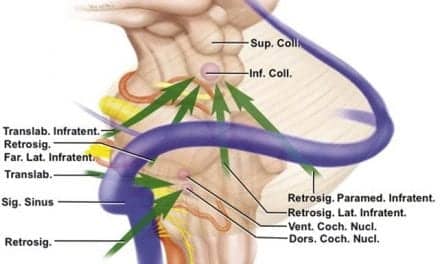Research | February 2019 Hearing Review
A long-term study of 2,040 older adults found that cognitive decline was significantly reduced in subjects who used hearing aids. Published in the June 2018 Journal of the American Geriatrics Society—and summarized by Dawes et al2 in the January 2019 Hearing Review—the data were drawn from the Health and Retirement Study over an 18-year period. Subjects were age 50 and older, had no dementia at baseline, and began using hearing aids during the 18-year period. Cognitive function was assessed using short-term and delayed recall of a list of 10 words (episodic memory).
Before using hearing aids, participants could remember 0.1 fewer words on the memory test per year on average; following hearing aid use, the average rate of decline was reduced to 0.02 fewer words recalled per year. The investigators stated this “suggests that effective identification and treatment of age-related hearing impairment may have a significant impact on age-associated cognitive trajectories and possibly reduce the incidence of dementia.”2
As described in the 2018 Lancet Commission Report by Livingston et al,3 and summarized by me in the August 2018 HR,4 dementia is a major global health problem. The Lancet report suggested that treating risk factors could prevent or minimize 35% of dementia cases. It also found the strongest of the treatable factors is untreated hearing loss.3,4 On average, respondents in this study began using hearing aids at age 62. After controlling for covariates, such as age, gender, physical activity, and smoking, results indicated that episodic memory declined with age, but the rate of decline slowed significantly after beginning use of hearing aids.
Previous studies have also shown the negative effects of untreated hearing loss on cognitive function in older adults. For example, a groundbreaking study by Lin et al5 in 2011 found that “for individuals older than 60 years, more than one third of the risk of dementia was associated with hearing loss.”
Similarly, other studies have demonstrated a positive relationship between hearing aid use and cognitive function. Obuchi et al6 investigated hearing aid use and cognition in a small group of elderly adults. Twelve adults were divided into three sub-groups. The group of hearing loss without hearing aid use showed the lowest scores on the Wechsler Adult Intelligence Scale-Revised, while there were no differences in the normal-hearing and hearing loss with hearing aid use groups. However, it should be noted this was a retrospective study of a very small sample.
A recent large-scale prospective study by Amieva and colleagues7 examined the relationship between hearing loss, hearing aid use, and cognitive decline. The Personnes Agees QUID epidemiological study followed 3,670 randomly selected older adults over a 25-year period. Of these, 1,276 self-reported hearing loss, while 2,394 reported no hearing loss. The population was divided into three groups: 1) no hearing loss; 2) hearing loss and no hearing aids; 3) hearing loss with hearing aids. Subjects were seen about every 2 years over the 25-year period, with neuropsychological evaluations of cognitive performance, cognitive complaints, and functional ability given at most visits. At baseline, all those reporting hearing loss had significantly lower scores on scales of global cognitive performance compared to the group reporting normal hearing.
At the 25-year follow-up, subjects not using hearing aids declined more rapidly on cognitive performance measurements than those who used hearing aids. Furthermore, subjects with hearing loss who used hearing aids had no significant difference in cognitive decline from the control group. Although this long-term study found that adults who used hearing aids did not experience the cognitive decline associated with untreated hearing loss, this was not a randomized controlled trial. It may be that adults who choose to use hearing aids differ in other ways from those who choose not to.
Possible Causes
Lin et al5 suggested social isolation and cognitive load as possible causes of the negative effect of untreated hearing loss on cognition: “When the clarity of words is garbled, the brain has to allocate resources to hear at the expense of other brain function.”
Maharani et al1 attributed the negative effects of untreated hearing loss on cognition to two possible causes: 1) both hearing loss and dementia are caused by age-related decline in the central nervous system, or 2) the decline is due to auditory deprivation and the resulting reduced social engagement, and increased depression and anxiety. They argue that their findings support the latter explanation and suggest “Increased access to quality hearing health care might delay the onset of cognitive impairment [and help] reduce the impending dementia epidemic.”1
Conclusion
There is now a significant body of research that strongly supports the importance of treatment for adults with hearing loss. Intervention not only reduces the social isolation, depression, and anxiety that untreated hearing loss can cause, but can also play an important role in minimizing cognitive decline and delaying the onset of dementia. The benefits are significantly improved quality of life for millions of adults, as well as billions of dollars in healthcare savings.
Correspondence can be addressed to Dr Hampton at: [email protected]
Citation for this article: Hampton D. The case for preserving cognition with hearing aids. Hearing Review. 2019;26(2)[Feb]:20.
References
-
Maharani A, Dawes P, Nazroo J, Tampubolon G, Pendleton N, on behalf of the SENSE-Cog WP1 group. Longitudinal relationships between hearing aid use and cognitive function in older Americans. J Am Geriatr Soc. 2018;66(6):1130-1136.
-
Dawes P, Maharani A, Nazroo J, Tampubolon G, Pendleton N, on behalf of the SENSE-Cog WP1 group. Evidence that hearing aids could slow cognitive decline in later life. Hearing Review. 2019;26(1):10-11.
-
Livingston G, Sommerlad A, Orgeta V, et al. Dementia prevention, intervention, and care. Lancet.2017;390(10113):2673-2734.
-
Hampton D. Nine risk factors associated with dementia. Hearing Review. 2018;25(8):22.
-
Lin FR, Metter J, O’Brien RJ, Resnick SM, Zonderman AB, Ferrucci L. Hearing loss and incident dementia. Arch Neurol. 2011;68(2):214-220.
-
Obuchi C, Harashima T, Shiroma M. Age-related changes in auditory and cognitive abilities in elderly persons with hearing aids fitted at the initial stages of hearing loss. Audiol Res.2011;1(e11):40-41.
-
Amieva H, Ouvrard C, Giulioli C, Meillon C, Rullier L, Dartigues J-F. Self-reported hearing loss, hearing aids, and cognitive decline in elderly adults: A 25-year study. J Am Geriatr Soc. 2015;63(10):2099-2104.







Thank you for the summary and references that’s very helpful.